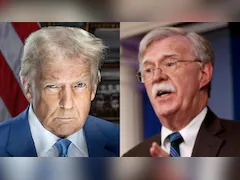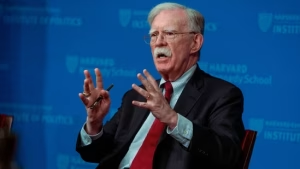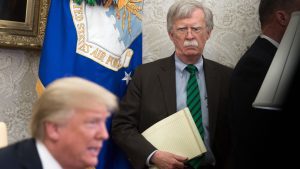Washington D.C. – The John Bolton indictment has sent shockwaves through Washington’s political establishment as the former national security adviser faces eighteen criminal counts for unlawfully retaining and transmitting classified information. The former Trump administration official, John Bolton, who notably defended India amid recent trade tensions, now stands accused of sharing over one thousand pages of top-secret government records with unauthorized individuals.
The Charges Behind the John Bolton Indictment

The John Bolton indictment centers on allegations that the former NSA retained classified documents at his residence and shared sensitive information with two unauthorized individuals, reportedly his wife and daughter. According to the US Justice Department, the classified material revealed critical intelligence about future attacks, foreign adversaries, and foreign-policy relations.
A federal grand jury in Maryland brought the John Bolton indictment, charging him on eighteen counts of transmitting and retaining classified information. The severity of these charges underscores the sensitive nature of the documents involved and the potential national security implications.
Compromised Email and Iran Connection


Adding another dimension to the John Bolton indictment is the revelation that Bolton’s personal email account, allegedly used to share classified information, was compromised in a cyberattack. Intelligence officials attribute this breach to a group believed to be linked to Iran, raising concerns about potential foreign access to American secrets.
This cyber incident compounds the seriousness of the John Bolton indictment, as it suggests classified information may have been exposed to hostile foreign actors beyond the unauthorized family members mentioned in the charges.
Bolton’s Response: Claims of Political Weaponization

John Bolton has vehemently denied all charges in the indictment, characterizing the prosecution as an “intensive effort” by President Donald Trump to target his political adversaries. “Now, I have become the latest target in weaponising the Justice Department to charge those he deems to be his enemies with charges that were declined before or distort the facts,” Bolton stated in his defense.
The John Bolton indictment follows a pattern of legal action against prominent Trump critics. New York Attorney General Letitia James and former FBI Director James Comey have also faced criminal charges recently, lending credence to Bolton’s claims about politically motivated prosecutions.
Also Read: Trump Modi Russia Oil: Explosive Claims Spark Firm Indian Denial
Bolton’s Service as Trump’s National Security Adviser
Before the John Bolton indictment, Bolton served as President Trump’s national security adviser for seventeen months during the first presidential term. His tenure ended in 2019 when Trump fired him, marking the beginning of Bolton’s transformation into one of the administration’s most vocal critics.
During his time as NSA, Bolton was known for his hawkish foreign policy positions and strong stance on international security matters. However, his relationship with Trump deteriorated over policy disagreements, ultimately leading to his dismissal.
Defending India on Tariff Issues
Prior to the John Bolton indictment, the former diplomat emerged as a prominent voice supporting India during escalating trade tensions with the United States. When Trump imposed fifty percent tariffs on Indian imports, Bolton publicly defended India’s position, particularly regarding Russian oil purchases.
Bolton maintained that India had every right to purchase Russian oil, a key factor behind half of Trump’s tariffs on Indian goods. He argued that Western sanctions on Moscow during the Ukraine war should not prevent countries from buying Russian oil at the capped price and reselling it elsewhere at a profit.
“The complaint is that India took some of the gasoline it was buying from Russia, perhaps refined it and sold it internationally. That’s a complaint worth discussing. But the sanctions, as written, do not preclude anyone, including India, from buying Russian oil at the capped price, or below $60/barrel, and then selling it elsewhere. If that’s the complaint, the complaint lies with the sanctions, not so much with India’s behaviour,” Bolton explained in an interview.
Criticism of Trump’s India Policy


The John Bolton indictment comes months after Bolton sharply criticized Trump’s handling of US-India relations. Following Prime Minister Modi’s meetings with Chinese President Xi Jinping and Russian President Vladimir Putin in China last August, Bolton accused Trump of setting “US-India relations back decades.”
This criticism reflected Bolton’s broader concerns about Trump’s foreign policy approach and his belief that the administration was mishandling crucial international relationships. His defense of India on the tariff issue was among several policies where he opposed Trump’s decisions.
Pattern of Targeting Trump Critics
The John Bolton indictment fits within a broader pattern of legal actions against individuals who have criticized the Trump administration. Bolton isn’t the first former aide or opponent to face criminal charges, raising questions about the Justice Department’s independence and the potential politicization of law enforcement.
Bolton’s assertion that these charges represent weaponization of the justice system resonates with concerns expressed by other Trump critics who have faced legal scrutiny. The timing and nature of the John Bolton indictment have intensified debates about prosecutorial discretion and political motivation in high-profile cases.
Implications and Future Proceedings
As the John Bolton indictment moves forward through the legal system, it will test the boundaries between legitimate prosecution of classified information violations and politically motivated charges. Bolton’s legal team is expected to mount a vigorous defense, arguing that the charges are baseless and politically driven.
The outcome of the John Bolton indictment could have significant implications for other former government officials who possess classified information and for the broader debate about presidential authority over the Justice Department. As proceedings continue, this case will remain closely watched by legal experts, foreign policy analysts, and political observers nationwide.

